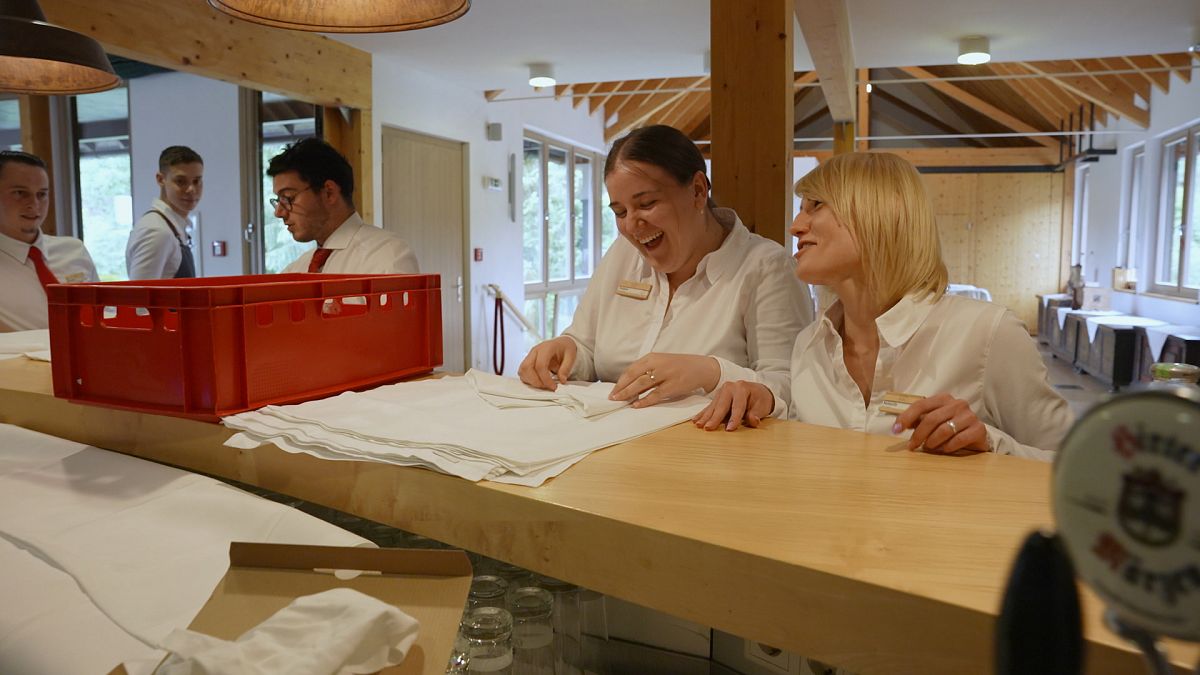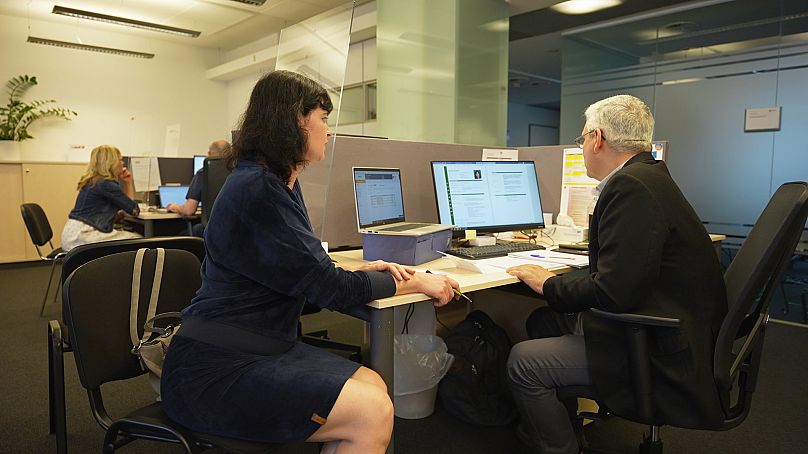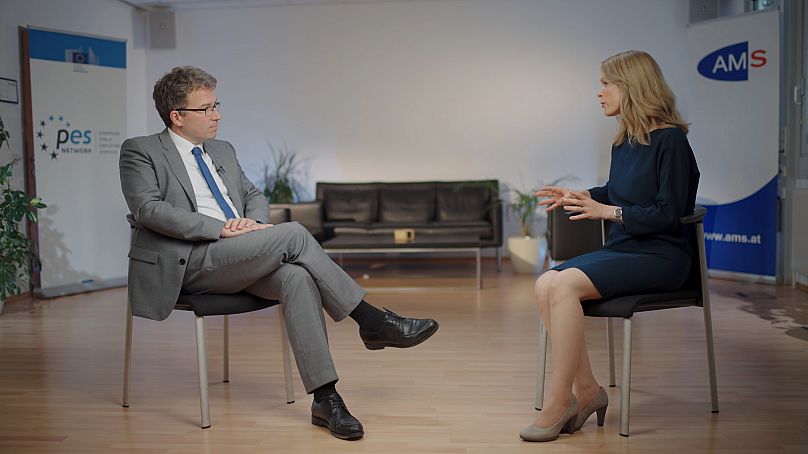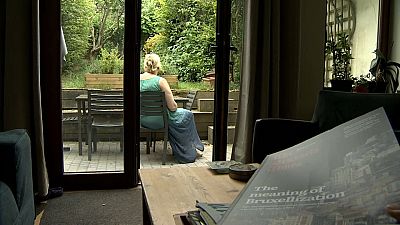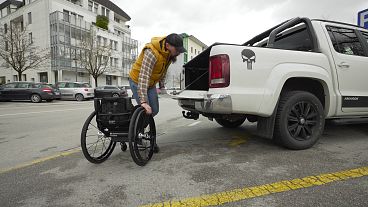Ukrainians fleeing Russia’s war in their country have the right to live and work in the EU for up to three years - but how difficult is it to find a job? And what does this influx of refugees mean for Europe’s workforce and economy?
Ukrainians fleeing Russia’s war in their country have the right to live and work in the EU for up to three years.
This episode of Real Economy takes a look at the difficulties Ukrainians may face trying to find a job and asks: what does this influx of refugees mean for Europe’s workforce and economy?
Real Economy travels to Austria to hear the stories of two Ukrainian women, recently arrived with their children. Plus we ask the head of Europe's Public Employment Services Network, Johannes Kopf, what the EU is doing to help Ukrainians find work.
Opportunities in the tourism industry
Over 40,000 Ukrainian refugees are staying in Austria with their children. A temporary residence permit allows them to live and work in the country.
Natalia has settled in the Carinthia region in the south of the country, known for its mountains and lakes. Back in Ukraine, she was a beautician. When she arrived at a local refugee centre, hotel managers offered her accommodation and a job.
"I really like the work here," she says. "We signed a contract until September, then I will look at how the situation develops in Ukraine."
The tourism industry in Austria is booming and since 2019 the number of job vacancies in the hospitality sector has doubled, with many employers unable to find staff.
For manager Alexandra Tiefenbacher, offering available rooms and vacant positions to Ukrainian refugees for the summer season was an obvious choice.
"There are now around 60 to 70 living here," she says. "And 29 of them work for us in various departments: the kitchen, the restaurant, in housekeeping, building services, childcare. It's going pretty well. Of course there's a language barrier, but we can handle it."
Natalia speaks a little English, which enables her to communicate with colleagues. But juggling her job commitments and care for her 5-year-old daughter is a challenge.
"It's difficult," she says. "There’s a children's playroom here, but it closes at 4.30 pm. If I have a shift that finishes at 11 in the evening, then I still need to get someone to babysit."
Since the beginning of Russia’s war in Ukraine more than 7 million Ukrainians have fled their country, although an estimated 2 million have returned home. Most are women and children.
They can face various difficulties in finding employment, in particular needing to care for children and find childcare or school places. They may be suffering from severe trauma. Newly arrived Ukrainians cannot always speak the language of their new country and their qualifications may not be not recognised.
Helping Ukrainians access jobs
To help , the EU is providing language courses and training as well as Ukrainian-language guidelines on how to access the job market.
The European Commission is helping EU employers understand and recognise Ukrainian qualifications and has translated Europass , where users create a CV for use across Europe, into Ukrainian.
It has also translated the EU Skills Profile Tool into Ukrainian. The tool helps map the skills, qualifications and work experience of refugees, migrants and citizens of non-EU countries who are staying in the EU.
The European Commission is also launching an ‘EU Talent Pool’ to match Ukrainian refugee skills with job vacancies.
Barriers in other sectors
In Austria, other sectors like health and IT lack qualified people. But although half the Ukrainian refugees registered in the country have a university degree, immediate access to these positions is difficult.
Ganna Zhygun, a mother of three and a German teacher from Ukraine has recently arrived in Vienna.
"The most important thing for me was finding school places for my three children," she says. "Now I've found that, I'm looking for a job."
Ganna would like to work as a German teacher helping other refugees who don't speak the language, but her diploma isn't recognised in Austria.
"My educational documents have to be translated, legally acknowledged and recognised," she explains. "It's a problem, it takes a long time."
Staff at a job centre set up to help refugees in Vienna are helping Ganna with this process.
"We accompany them to appointments," says Marjana Celebi, an advisor at the job centre. "We translate and help where necessary. The goal is to build a large network with all the involved partners, so we can help as quickly as possible."
In the meantime, Ganna, like other refugees registered in Austria, receives the minimum wage and health insurance.
The Vienna job centre is part of Austria's Public Employment Service (AMS.) The head of AMS, Johannes Kopf, is also chair of the EU's Public Employment Service network.
He spoke to Real Economy's Naomi Lloyd about how managing the influx of Ukrainian refugees at the European level is a top priority.
He explained how countries have been supporting each other and sharing their experiences.
Sharing best practice
"The topic came up just a few days after this terrible war started," says Kopf. "When our Polish colleagues informed the network that the first Ukrainians will show up and need help. This led to really a big wave of solidarity within the public employment services all over Europe.
"There are some states: Sweden, Germany, Austria that have gained a lot of experience in the refugee crisis in 2015/16 and after. For instance, organising the process of the recognition of skills or how to organise individual skill-mappings in their mother tongue."
He explained that the refugees arriving now have particular needs, that differ to previous refugee crises.
"Right now, most of the people who come, are women with small children, and they have different needs, of course. The most important is there is a need for childcare. Austria has to organise enough places in schools, in kindergarten and so on. And the next step then is entering the labour market."
The European Network of Public Employment Servicesplays a key role in matching the skills of newly arrived Ukrainians with the needs of the labour market and has publicly expressed its solidarity with Ukrainians and its commitment to supporting those fleeing the war
How can Europe meet the challenge of successfully integrating Ukrainian refugees?
Real Economy put the question to Sandra Leitner, a specialist in migratory movements for the Vienna Institute for International Economic Studies.
"If it’s only about labour market integration, if we factor out the cultural aspect, political backlash, we learnt a lot I think from previous migration waves in terms of what really is important to smooth the transition into the labour market," Leitner says.
"And that’s: language, education, recognition of qualifications. With all those elements in place, I think anyone can be welcome."
For Johannes Kopf, helping Ukrainians integrate is first and foremost about solidarity with the refugees.
When asked how the new arrivals from Ukraine could help with skills and labour shortages in the EU, he replied:
"Of course, there are vacancies and companies that really are searching hard for skilled staff and now have the hope of finding, for instance, I.T. experts from Ukraine. Of course.
But I don't really like to mix asylum or refugee topics with labour market needs. Yes, it's better to integrate all of these people than to just pay them social benefits. But first, and this is the most important, it's a humanitarian question."
